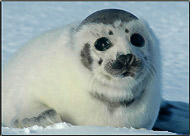 Canada is gearing up for its brutal annual slaughter of baby seals, setting its highest quota ever at a time when the seal populations are also threatened by climate change.
Canada is gearing up for its brutal annual slaughter of baby seals, setting its highest quota ever at a time when the seal populations are also threatened by climate change.
Harp and hooded seals rely on the presence of sea ice, on which they give birth to and nurse their pups. But over the past decade, global warming has caused a steady decline in the sea ice cover off Canada’s east coast …
When sea ice does not form properly, mother seals often abort in the water. If the ice forms but breaks up before the pups are strong enough to swim, thousands of the pups die in the water. In 2002, a particularly bad ice year, the Canadian government estimated that 75 percent of the pups born in the Gulf of St. Lawrence died when the ice melted too soon. This year’s ice conditions appear to be worse than those of 2002.
The Canadian government’s own scientists are warning that the quota for the hunt needs to be dramatically lowered. But the government is still moving ahead with the highest quotas in history. In response, the Humane Society of the United States is renewing its boycott of Canadian seafood:
Why boycott Canadian seafood?
Canadian seafood exports to the United States contribute $3 billion annually to the Canadian economy — dwarfing the few million dollars provided by the seal hunt. The connection between the commercial fishing industry and the seal hunt in Canada gives consumers all over the world the power to end this cruel and brutal slaughter.
Go here to take the pledge or learn more.
The Canadian seal hunt was the reason I first heard of Greenpeace, as a grade school kid back in the mid 70s. I remember hearing about these courageous environmentalists who would go out onto the ice and spray the baby seals’ fur with a harmless orange dye, in order to render their pelts useless to the hunters. I thought that was the most brilliant thing I’d ever heard. I remember putting crumpled dollar bills from my allowance into envelopes to send to Greenpeace, and years later, canvassing for Greenpeace was my first job out of college. It’s beyond depressing that several decades later, Canada is still allowing harp seals to be slaughtered. Canada is a great country in so many ways — one expects better from them.

No Comments so far ↓
Like gas stations in rural Texas after 10 pm, comments are closed.